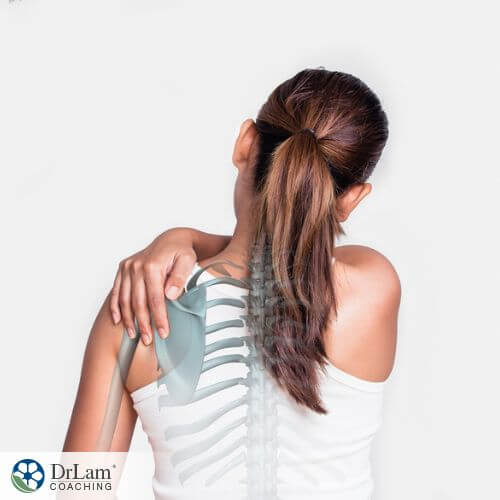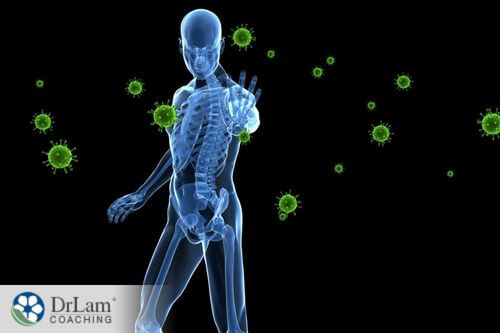 According to the Centers for Disease Control and Prevention, the incidence of osteoporosis in those over fifty years of age jumped from 9.4% in 2008 to 12.6% in 2018. And in women, this increase was from 14% to 19.6% in the same period. Many factors are blamed for this, but one seldom gets mentioned: problems with your mitochondria. So, what are mitochondria and what do mitochondria and bone health have in common?
According to the Centers for Disease Control and Prevention, the incidence of osteoporosis in those over fifty years of age jumped from 9.4% in 2008 to 12.6% in 2018. And in women, this increase was from 14% to 19.6% in the same period. Many factors are blamed for this, but one seldom gets mentioned: problems with your mitochondria. So, what are mitochondria and what do mitochondria and bone health have in common?
To tackle this subject, we first need to understand osteoporosis and its contributing factors. Once we have that established, we can take a deeper look into mitochondria, and the correlation between mitochondria and bone health.
We tend to think about osteoporosis as something that affects elderly women. The word osteoporosis itself means porous bone. In other words, a weakened bone that breaks easily. And the problem with this condition is that you have no symptoms. Many osteoporosis assessments are only determined after the person with the condition experiences a serious, painful fracture.
Although science understands how osteoporosis develops, much speculation exists about the exact cause or causes. The condition itself sees a slow decline in bone density which makes your bones more porous and susceptible to breakage.
Your bones themselves consist of living tissue. Your bones support your body and protect your internal organs. They also produce new blood cells, store certain minerals, and have an effect on your body’s endocrine regulation. As you age, however, you may experience hormone imbalances and nutritional deficiencies that may impact your bone health or its ability to regenerate. The use of certain medications may also influence this ability. This could cause an imbalance in your bone’s ability to remodel itself, with bone resorption fast outpacing your bone formation ability. Skeletal-muscle health may also play a role. And the degradation of your muscle mass, a continuous process, may start in your thirties.
Interestingly, increasing research shows the strong possibility of bone health depending on muscle health. Molecules secreted by both work together to form a state of balance. This is especially the case for bone mass reinforcement. Those with osteoporosis may also experience sarcopenia, a decline in muscle mass that is associated with the loss of strength and a decline in physical performance. This phenomenon has led to a newly-identified health condition called osteosarcopenia, a term including the presence of both disorders.
Although most people associate osteoporosis with the aging process, many other factors come into play. These include:
The factors mentioned may all influence mitochondria and bone health.
 You may have heard mitochondria referred to as your body’s powerhouse. And in a sense, this is true. Mitochondria, found in just about every cell in your body, are responsible for your body’s energy production. They convert the food you eat and the oxygen you breathe into energy. The energy produced is stored in a molecule within the mitochondria called adenosine triphosphate (ATP). ATP is used in the performance of every cell function. Your mitochondria also perform a key role in your detoxification process and fight free radicles that can cause cellular damage.
You may have heard mitochondria referred to as your body’s powerhouse. And in a sense, this is true. Mitochondria, found in just about every cell in your body, are responsible for your body’s energy production. They convert the food you eat and the oxygen you breathe into energy. The energy produced is stored in a molecule within the mitochondria called adenosine triphosphate (ATP). ATP is used in the performance of every cell function. Your mitochondria also perform a key role in your detoxification process and fight free radicles that can cause cellular damage.
Damaged mitochondria, on the other hand, can contribute to numerous health issues. The most common of these include memory loss, fatigue, heart disease, diabetes, and neurodegenerative disorders. We also find osteoporosis on this list.
This is because damage to mitochondria not only affects ATP production but may also trigger an increase in osteoclast production. Osteoclasts break down the bone for bone resorption.
Mitochondria also play a key role in maintaining muscle health and in ensuring your immune health as well.
Mitochondria can be damaged in several ways. Pathogens, viruses, parasites, and certain toxins like heavy metals can cause this damage. Oxidation is another common cause of this damage. The term oxidation refers to the chain of chemical reactions in the body caused by free radicals.
Part of a cell’s normal metabolic function is the production of these free radicals. However, your cells are also exposed to external sources of free radicals. When your cells have more free radicals present than they can deal with, they may suffer from oxidative stress. This may result in mitochondrial damage.
The most common contributors to free radical production and the accompanying oxidative stress and mitochondrial damage include an inadequate diet, a sedentary lifestyle, and exposure to external toxins and/or infections. The latter includes smoking, toxins in your environment, drinking too much alcohol, and the use of certain medications.
Your bones undergo a constant process of regeneration. Osteoblasts constantly build new bones. At the same time, osteoclasts break down bone. In healthy individuals, these two processes work in balance.
However, in people with osteoporosis, they do not work in balance. The osteoblasts build less bone than the osteoclasts break down. This results in the bones losing their density and thus strength, allowing them to break more easily than they normally would.
Besides contributing factors like chronic inflammation and others risk factors listed above, mitochondrial damage has been identified as a possible cause of this in a new study conducted by the University of Pennsylvania. In other words, mitochondria and bone health share a close relationship.
According to the study, mitochondria affect macrophage function. Macrophages are a type of immune cell that form the front line of your immune response. They surround and digest any foreign invaders entering your body.
Macrophages, however, can transform into osteoclasts, depending on the circumstances. And this transformation could encourage osteoporosis.
When damaged, mitochondria give out a stress signal and transform into osteoclasts at a much quicker rate. This increases osteoclast concentration, which then hastens the rate at which bone gets broken down.
So, even if your osteoblasts work at their normal speed, the quicker breakdown process contributes to osteoporosis. With other factors, this can become the perfect storm that encourages excessive osteoclast production.
The root cause of this increased osteoclast production could be related to stress. Exposure to toxins, viruses, and parasites also cause stress and mitochondrial damage. And all these factors contribute to your body’s NeuroEndoMetabolic (NEM) stress response activation. Stress may thus play a role in mitochondria and bone health.
 Stress of any kind leads to your body’s NEM stress response activation. Your NEM stress response, guided by your Hypothalamic-Pituitary-Adrenal (HPA) axis, regulates each activity in your body when stress abounds. It is made up of six circuits or related organ systems. Your Inflammation Circuit, containing your immune system, is one of these systems.
Stress of any kind leads to your body’s NEM stress response activation. Your NEM stress response, guided by your Hypothalamic-Pituitary-Adrenal (HPA) axis, regulates each activity in your body when stress abounds. It is made up of six circuits or related organ systems. Your Inflammation Circuit, containing your immune system, is one of these systems.
When faced with the presence of any foreign pathogen, your immune system automatically kicks in. Your inflammatory response, part of your immune function, will try and get rid of these foreign pathogens.
Your mitochondria play a significant role in inflammatory signaling. They may initiate an inflammatory response during stressful periods. But it may also come at a cost, as their ability to produce energy decreases during this time.
Inflammation tells you your body is working to heal itself or deal with a threat. Chronic inflammation, however, as is seen in those with adrenal fatigue, could have a detrimental effect on a variety of chronic conditions. Chronic inflammation, instead of ridding your body of a foreign pathogen invasion, may itself add stress to your body.
Because stress is one of the contributing factors to mitochondrial damage, mitochondria and bone health have a close connection.
Mitochondria and bone health issues typically have no concrete symptoms. However, the following may serve as a warning of the possibility:
If you have any of these signs, you may need to think about seeing your healthcare provider. Tests may determine whether you have issues with your mitochondria and bone health.
Prevention is better than a cure when it comes to reducing your risk of osteoporosis and promoting mitochondria and bone health. While there are some things you can do nothing about, like aging, you can do much to reduce your risk.
A healthy diet ensures your body gets all the vitamins and nutrients it needs for all systems to work optimally. This means drastically cutting down your sugar and processed foods consumption. It also means stocking up on lean meat products and eating plenty of fresh, organic fruits and vegetables. Fruit and vegetables are rich antioxidant sources that fight free radicals and the oxidation process.
Intermittent fasting may also enhance and promote mitochondria and bone health, according to literature. If considering intermittent fasting, please first talk to your healthcare provider. They are best able to determine whether it is suitable when taking your health history or medication use into account.
Exercise promotes bone mass and density as well as an increase in muscle mass. It also benefits mitochondrial function and efficacy. But keep in mind that exhaustive exercise may have the opposite effect because it contributes to the production of free radicals that may cause damage to mitochondria.
Resistance and endurance training may help counteract mitochondrial damage while improving mobility, movement, and strength. Strength training and weight-bearing exercises may help strengthen both the bones and muscles in your spine and arms. Examples of good exercises include jogging, walking, skipping, tai chi, yoga, and Pilates.
Do remember that vigorous exercise may impact adrenal health if you are in the later stages of adrenal fatigue. So when starting an exercise regime, take it slow and steady, focus on gentle exercises, and talk to your doctor if you have other health conditions.
 You may not be in a position to avoid toxin exposure outside your home, but you can do something about it in your home. For example, take note of the toxins used in your cleaning products. You may also find toxins in your personal hygiene products. These include your shampoo and conditioner, deodorant, makeup, and even toothpaste. Read the fine print on the labels!
You may not be in a position to avoid toxin exposure outside your home, but you can do something about it in your home. For example, take note of the toxins used in your cleaning products. You may also find toxins in your personal hygiene products. These include your shampoo and conditioner, deodorant, makeup, and even toothpaste. Read the fine print on the labels!
Stress affects your hormone production and inflammatory response. This can result in oxidative damage that harms your mitochondria and bone health. You can use many techniques to help you deal with mental stress. Improving your diet and avoiding toxins may help reduce the effects of environmental stress.
Many supplements benefit mitochondria and bone health.
Please remember that supplements may cause interactions with existing health conditions as well as medications. Before taking a supplement, please first talk to your healthcare provider about its suitability.
Many factors contribute to mitochondria and bone health. Aging is not the only cause of osteoporosis. You can do something about reducing your risk.
If worried about mitochondria and bone health, here are a few things you can do to help alleviate the situation.
If you are dealing with osteoporosis and potential mitochondrial damage, the team at Dr. Lam Coaching can help. We offer a free** no-obligation phone consultation at +1 (626) 571-1234 where we will privately discuss your symptoms and various options. You can also send us a question through our Ask The Doctor system by clicking here.

Build Stronger Bones with OsteoForte! Defy Osteoporosis Naturally
Mitochondria and bone health most certainly share a connection. Osteoclasts and osteoblasts, which build and reabsorb bone, are affected by mitochondria signaling. Damaged mitochondria could result in your bones becoming brittle and breaking easily.